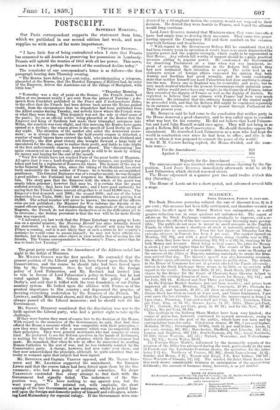Mr. MILNER GIBSON was the first speaker. He contended that
the present position of the Liberal party has been forced upon them by the Conservatives, and the course he should take had been forced upon him by the Government. Once he had objected to the foreign policy of Lord Palmerston, and Mr. Roebuck had invited him to vote in favour of Lord Palmerston's policy in Greece, but he had voted against him. Mr. Gibson reviewed the policy of Lord Derby's, and said that it trifled with the very foundation of our Parlia- mentary system. He looked upon the alliance with France as of the greatest importance to this country ; and deprecated the practice of decrying everything undertaken by the Emperor of the French. Mr. Ltansav, amidst Ministerial cheers, said that the Conservative party had always passed all the Liberal measures ; and he should vote for the Government.
Mr. SIDNEY HERBERT considered that the dissolution was war to the knife against the Liberal party, who had a perfect right to take up the challenge. If they were beaten they must of course bow to the decision of the 'House. With regard to the measures of the Government, he said, that first they
offered the House a measure which was compatible with their principles,—
now they were disposed to offer a measure which was incompatible with their principles. They were general merchants who had samples of every kind. He preferred to see the Reform question in the hands of Reformers,
to waiting for the fulfilment of the promises which the Government had made. He remarked, that when he was in office he succeeded in sending Roman Catholics to the seat of war, and he was violently resisted by the Conservative party. A change, however, had now come over them, and they now acknowledged the principle, although he quite admitted that no treaty or compact upon that subject had been signed.
Mr. BEN-PIM:1K and Captain VERNON opposed, and Mr. DANDY SEY- MOUR and Mr. LEATHAM supported the amendment. Sir GYORGE Lzwis said that the course taken had been forced upon them by the Go- vernment; who had been guilty of political cowardice. Sir Jogs Pawl-Naxos contended that every attempt to find fault with the Government had signally failed. The indictment of the Op- position was, " We have nothing to say against you, but we want your places." He pointed out, with emphasis, the short comings of the late Government as law reformers, whilst he prided him- self upon the foreign and domestic policy of himself and colleagues, select- inglord Malrnesbury for especial eulogy. If the Government were con- demned by a triumphant faction the country would not respond to their decision. He denied they were hostile to France, and hoped the alliance would long continue.
Lord JOHN RUSSELL insisted that Ministers since they came into olio 0 have had ample time to develop their measures. They came into power having opposed the Conspiracy Bill and their conduct on the occasion was both factious and treacherous.
" With regard to the Government Reform Bill he considered that if it had been twenty years in operation it would have very much diminished the popular power and the popular strength, which ought to be represented in that House. Any reform bill worthy of support should be a plain practical measure adding to popular power. He condemned the Government for dissolving Parliament at a time when war was imminent, in- stead of accepting the alterations in the Reform Bill which they had now intimated their intention to accept. The noble lord in an elaborate review of foreign affairs expressed his opinion that both Austria and Sardinia bad acted wrongly, and he could confidently state that neither himself nor Lord Palmerston had done anything to stimu- late the war. Every one in England was for neutrality and peace, but he very much doubted whether the present Government could maintain peace. Their advice would never have any weight in the Councils of France, unless they consulted the dignity of France as well as the dignity of Austria. He regretted to believe that our alliance with France had been very much weakened. He intimated that the ordinary business of the session might be proceeded with, and that the Reform Bill might be considered separately in an autumn session, so that it might be passed through Parliament du- ring the present year.
Mr. ROEBUCK said he had come to the conclusion that neither party in the House deserved a good character, and he was called upon to consider what was best for his country. He did not believe that Lord Palmers- ton and Lord John Russell would ever agree. They will not bring in so good a Reform Bill as the Conservatives. He should therefore oppose the amendment. He described Lord Palmerston as a man who had kept the world in combustion ever since he had been in office ; and this is the man to whom it was proposed to commit the peace of the world !
Sir H. M. Cannes having replied, the House divided, and the num- bers were—
For the Amendment........ 323 Against it 310 Majority for the Amendment 13 The announcement was received with tremendous cheering by the Op- position. Lord Joust RUSSELL immediately afterwards wont to sit by Lord Palmerston which elicited renewed cheers.
The House adjourned at a quarter past two until twelve o'clock this day (Saturday).
The House of Lords sat for a short period, and advanced several bills a stage.


























 Previous page
Previous page